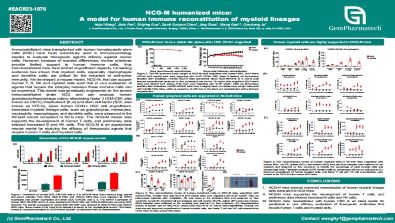
NCG-M humanized mice: A model for human immune reconstitution of myeloid lineages
Immunodeficient mice transplanted with human hematopoietic stem cells (HSC) have been extensively used in immuno-oncology studies to evaluate therapeutic agents' efficacy against cancer cells. However, because of species differences, murine cytokines provide limited support to human immune cells, thus immunodeficient mice have limited engraftment capacity. Increasing evidence has shown that myeloid cells, especially macrophages and dendritic cells, are critical for the induction of anti-tumor immunity.
We developed a mouse model, NCG-M, that can support human T, B, NK and myeloid cells such that in vivo evaluation of agents that require the interplay between these immune cells can be examined. This model was genetically engineered on the severe immunodeficient strain NCG and can produce human granulocyte/macrophage colony stimulating factor 2 (GM-CSF, also known as CSF2), interleukin-3 (IL-3) and stem cell factor (SCF, also known as KITLG).
Upon human CD34+ HSC engraftment, increased myeloid lineage cells, such as granulocytes, monocytes, neutrophils, macrophages, and dendritic cells, were observed in the NCG-M cohort compared to NCG mice. The NCG-M mouse also supports the development of human T cells, and preliminary data showed increased B and NK cells. The NCG-M is an appropriate mouse model for studying the efficacy of therapeutic agents that require human T cells and myeloid cells.
Download
We developed a mouse model, NCG-M, that can support human T, B, NK and myeloid cells such that in vivo evaluation of agents that require the interplay between these immune cells can be examined. This model was genetically engineered on the severe immunodeficient strain NCG and can produce human granulocyte/macrophage colony stimulating factor 2 (GM-CSF, also known as CSF2), interleukin-3 (IL-3) and stem cell factor (SCF, also known as KITLG).
Upon human CD34+ HSC engraftment, increased myeloid lineage cells, such as granulocytes, monocytes, neutrophils, macrophages, and dendritic cells, were observed in the NCG-M cohort compared to NCG mice. The NCG-M mouse also supports the development of human T cells, and preliminary data showed increased B and NK cells. The NCG-M is an appropriate mouse model for studying the efficacy of therapeutic agents that require human T cells and myeloid cells.


